- Home
- Anne Rivers Siddons
Peachtree Road
Peachtree Road Read online
ANNE RIVERS SIDDONS
PEACHTREE ROAD
For Lee, Kemble, Rick and David
My main men
And for Betsy Fancher
FOREWORD
When I wrote Peachtree Road, slightly more than ten years ago, I was aware, even in the first of its pages, that I was writing a bittersweet love song to a place that would cease to exist before the book was published. It has always been the nature of Atlanta to change like a chameleon, to be gone somewhere else entirely before the eye and the heart could hold it. It has been a city on the make and on the move all its young life, and the great arc of its trajectory has carried with it an incalculable number of vigorous, eccentric and none-too-principled men and women, among whose number were a handful who literally reinvented the city and the South in the short, supercharged decade of the Sixties. It was these men and women that I wanted to write about, and it was their home and their city I wanted to catch for myself and posterity before they, too, were gone into the sun.
A writer is never sure if he or she has succeeded with a book, or even what “succeed” means, but I do know that Peachtree Road opened a new door for me, one that led me to a world I might never have known. I like to think perhaps I was, in turn, able to introduce Atlanta to them. It was and is an Atlanta as surely gone with the wind as the one young Margaret Mitchell wrote of more than sixty years earlier, but to me, no less beautiful and seductive than that one.
My particular Atlanta, too, is nearly gone now, but I like knowing that I can find it anytime I want to revisit it, in these pages. It gave sweetness and shape to my first youth, and I will always think of it as Shep Bondurant did, in these words: “Peachtree Road…it is to me a name with far more scope and resonance than its dozen or so meandering miles of asphalt should rightly command…. Admittedly I see it now through the scrim of youth, but I do not think it looks like anywhere else on earth, and the very name of it rings in my heart like a bell.”
—Anne Rivers Siddons
February 4, 1998
Atlanta
Some of the time, going home, I go
Blind and can’t find it.
The house I lived in growing up and out
The doors of high school is torn
Down and cleared Away for further development, but that does not stop
me.
First in the heart
Of my blind spot are
The Buckhead Boys. If I can find them, even one,
I’m home. And if I can find him catch him in or
around
Buckhead, I’ll never die; it’s likely my youth will walk
Inside me like a king.
—JAMES DICKEY
“Looking for the Buckhead Boys”
CONTENTS
FOREWORD
PART ONE
PROLOGUE
The South killed Lucy Bondurant Chastain Venable on the day…
ONE
Lucy came to live with us in the house on…
TWO
They had not been in the house a week before…
THREE
Is that thing real?” Lucy whispered loudly to me, over…
FOUR
Over that first year of fighting there hung and still…
FIVE
They quarantined us immediately. Even before Jamie’s funeral, they separated…
SIX
Some people say that the great change began then, in…
SEVEN
This time our separation was complete. Martha and Shem Cater…
EIGHT
When I crossed Peachtree Road on a breathless, flaccid morning…
NINE
When I turned sixteen and got the red and white…
TEN
That afternoon I had a tentative date with Charlie Gentry…
PART TWO
ELEVEN
On a misted Sunday morning in late October, in the…
TWELVE
When I came into the Peachtree road house on that…
THIRTEEN
“I never get over the feeling that I’m going to…
FOURTEEN
Sarah graduated magna cum laude from Agnes Scott College in…
FIFTEEN
When I would not go to them, they came to…
SIXTEEN
The next Friday night I slept, for the first time…
SEVENTEEN
My father did not die, though. All through the cold…
EIGHTEEN
In Buckhead, when a titan falls, the rest of his…
NINETEEN
The police never found the Pumphouse Hill arsonist. In truth…
PART THREE
TWENTY
From the very beginning, Lucy’s bond with her daughter was…
TWENTY ONE
Looking back, I have come to think of the five…
TWENTY TWO
“Did you know about him?”
TWENTY THREE
Malory ran away so many times during the next decade…
TWENTY FOUR
“From now on we’ll be meeting mainly at funerals,” somebody—Freddie…
TWENTY FIVE
In October of Malory’s freshman year at Wellesley my father…
TWENTY SIX
Lucy never knew, after that New Year’s Eve, that she…
TWENTY SEVEN
Well, and so there we were again this afternoon, at…
ACKNOWLEDGMENTS
PRAISE
ABOUT THE AUTHOR
BOOKS BY ANNE RIVERS SIDDONS
COPYRIGHT
ABOUT THE PUBLISHER
PART ONE
PROLOGUE
The South killed Lucy Bondurant Chastain Venable on the day she was born. It just took her until now to die. It was a textbook murder, classical in concept, faultless in execution; a work of art, really, as such things go. And no wonder. It’s what we do best, kill our women. Or maim them. Or make monsters of them, which may be the worst of all.
I was thinking of that as I stood by Lucy’s grave in the Bondurant plot in Oakland Cemetery this afternoon, in the pale lemon sunlight of a Georgia autumn. Of that, and of many other things, this being the accepted time and place for reflection: a quiet burial in an old cemetery where your family and friends and everybody you know lie, or will. One of the other things I was thinking was how contented and tranquil I always feel here; mindless almost. I have always loved Oakland. Lucy and I played together here as children, forty-odd years ago.
It is not that I am morbid, although there would be plenty of people in our crowd to dispute that. To our collective mind, morbid is synonymous with “funny,” and there was not one of the people gathered here today, me included, who would not agree that Lucy’s cousin Shep Bondurant is “funny.” But morbidity is not the direction my aberration takes. Rather the opposite, I think. I’m pretty cheerful and optimistic, in the main, even if I don’t go out anymore, or hardly. If I were morbid, I expect I would be dead by now.
No, Oakland is not, to me, a place of shadows and stagnation. Not even of death. There is an air of ongoing bustle and life to it, in a silent and unseen way, of course, which is extremely attractive, in the manner of all places where like people dwell close together in harmony of purpose. The people here have their own grand, small mossy mansions, jumbled close together on tiny green, shaded lawns, and a tangle of brick streets threading the high hills, and fine old oaks and magnolias, and a great brick wall to keep out the riffraff, and a splendid view of Atlanta to the northwest, and uniformed servants to tend their lawns and streets and dwellings. That these citizens are all dead has always seemed to me quite beside the point of Oakland. The point is that its denizens are together, as they were in life, and safe
, and that they will never, for all eternity, have to deal with the one thing that they detested and feared most in their lifetimes: the increasing intrusion into their ordered world of trash and tackpots. They have left all that to us who only visit them here, and there were not a few of us in the knot of handsome, seemly people gathered to send off Lucy this afternoon who will be relieved to join their sheltered ranks. In the core group of Old Atlanta, of whom I speak, the ecstasy of Heaven is surely incidental to the insularity of Oakland.
Our crowd has always been in and out of Oakland almost as frequently and easily as we enter and leave our homes and clubs. From the time we were small children, Lucy and I were brought here on picnics, and before the city got strict about closing hours and vandalism, it was a prime spot in which to park and catch some monk—a cloying term somebody in my crowd devised for necking, which caught on and became the rage for several years. Lucy always swore that it was here that she and Red Chastain first made love, on top of Margaret Mitchell’s grave, on a spring night after a Phi Chi dance when she was sixteen.
“I swear the earth moved, Gibby,” she said. “Old Red thought it was his incomparable fucking, but I’m sure it was little old Peggy Mitchell applauding.”
I doubt that it really happened, though I know that Lucy was sleeping with Red by then, and Margaret Mitchell’s grave would have been just the sacramental fillip she would have chosen to mark the occasion of their first coupling. For one thing, Lucy was a baroque and gifted liar, and for another, Red was like a cat about his creature comforts, and would never have fucked on any but the levelest of ground, and then only atop the pristine Chatham blanket he kept in the trunk of the MG for such occasions. It’s even unlikely that he would have done it out of doors, having as he did access to any number of bachelor apartments around town, unless Lucy had brought him all the way to the brink before he could assess the alternatives. That is credible. Lucy had half our crowd lifting bumpers by the time she was twelve.
Oakland Cemetery hasn’t changed much in the hundred and thirty-odd years it has sheltered Atlanta’s favored dead. It is the city’s proud claim that all classes of citizens lie here, from poor black and unknown potter’s field inhabitants to Atlanta’s silkiest gentry, the ones who built the ornate Victorian mausoleums, whose names can be found on a great many municipal streets, parks and buildings. Strictly speaking, this is true; for four years, until Westview was built, Oakland was, so to speak, the only game in town, and indeed, a few blacks of some distinction are here, usually at the behest of the white families for whom they or their progenitors toiled. There is, too, a separate Jewish section, an area devoted to the Confederate dead, many of whom fell at the Battle of Atlanta, and an Irish quarter, tactfully dedicated to the Hibernian Rifles of our cherished War. But over the years our crowd has largely usurped Oakland for its own, and now very few tackpots or trash are honored here.
For all its homogeneity, it is an eccentric place, and I think that is why I am so fond of it. I can just hear my mother, who lies here, refuting that: “What a thing to say, Shep. These are our own people. The funny people are all at Arlington.” But Oakland has bite and particularity and an air of raffish festivity to it, an orneriness that calls out to me, my mother notwithstanding. Among its ubiquitous angels and lugubrious inscriptions are the graven images of the venality and pragmatism that are the soul of this city, and their robustness bids to far outlive the crumbling cherubim and the soot-weeping eggs and darts. One progenitor of a prominent family has his Ph.D. inscribed on his mausoleum. Another has had replicated on his the facade of his fine Greek Revival earthly mansion, complete with street number, lest anyone confuse it with someone else’s.
My favorite has always been that of the Smith family, one of whose members, a Jasper N., had himself carved life-size and set foursquare atop his mausoleum, hat on knee, gazing to the northeast at the fine view to be had of the city. In life, local legend says, Jasper refused to wear a tie, and in death he has not capitulated. That he gazes now, not at the city’s skyline, but at the Martin Luther King Metropolitan Atlanta Rapid Transit Station and the new Piggyback Rail facility of the old Fulton Bag and Cotton Mill, does not seem to disturb him. He can no longer see Cabbagetown, the rank warren of old wooden shanties that grew up around the mill, and for that he may be grateful. I would be, profoundly. I have not seen Cabbagetown since a bitter cold day more than twenty-five years ago, and after today, I will not willingly come this near to it again, not until it is my turn to take up residence at Oakland. Cabbagetown was the catalyst that finished transforming me into what is known, euphemistically, as a recluse, though it by no means precipitated the journey. I suppose you might say I was genetically programmed for that.
The Bondurant mausoleum, my own family’s port of embarkation, lies on the crest of one of Oakland’s many hills, shaded by a giant magnolia and a leaning, fruitless old holly. It is unprepossessing as the mausoleums there go, as spare and chaste and linear as the old scholar, my grandfather, who erected it. But it has a magnificent situation, being adjacent to the site of the long-ago mayor’s house from which General John B. Hood watched the Battle of Atlanta. Why that exercise in ignominy should so please my family I have never understood, but it did, especially my mother. Not herself a native Atlantan, she could and always did manage a tear when we visited the plot, and she would always say, “I can actually see the smoke and flames and hear the cannon. It just smites my heart.”
“Your heart gets itself smitten over some pretty odd things,” my father said on one of those occasions.
“We’d all be better off if yours got smitten over anything at all,” she replied.
I can see in retrospect that both of them were right.
Now, over the hulking carcass of the MARTA station and the dreary jumble of the rail yards, you can see the towers of commerce that have made us the hub of the Sunbelt, the undisputed capital of the Southeast, the crossroads, as it were, of the country: a grinding, jostling, hustling megalopolis of nearly three million people in a vast metropolitan area encompassing eighteen counties, spread out on our high green Piedmont plain under a stinking canopy of dull bronze, cupped between Kennesaw Mountain to the west, Stone Mountain to the east, the foothills of the Blue Ridge to the north, and still seeping south like the yolk of an undercooked egg.
Some of our downtown and midtown structures—the Trust Company of Georgia Tower, the First National Bank Building, the Georgia-Pacific Building, the Westin-Peachtree Plaza, the bone-white spires of Peachtree Center, the IBM Building—are very tall. That, to my eye, is all they are: tall. They scrabble and paw at the sky like pale, thin, unformed adolescent fingers. They are without distinction, except for their much-vaunted height. They are abrupt and nervous. It is a nervous skyline. The jangled skyscrapers do not let the observer forget that it was not the deep, rich arteries of the slow old rivers, but the thin, jackrabbity, stinking, robust veins of the railroads that were, for Atlanta, both nourishment and metaphor. From the very beginning, it was destined—or doomed, depending on your point of view—to be a business town.
And it’s a money town. Oh, very much a money town. Like height, money is the other conspicuous thing that we have. My lifelong friend Charlie Gentry told me once, at a fund-raising luncheon at the Commerce Club before I stopped going out, “Money is the aristocracy in this town, no matter what you hear at the Driving Club. Money and property. It sure as hell isn’t the old families. None of us were here more than a hundred and fifty years ago. There wasn’t even an outhouse to piss in until then. And the few of us who have been here since the beginning came from somewhere else—Savannah or Charleston or Richmond, where they really know about old. No wonder we holler so about gumption and guts. It’s what we have instead of blue blood.”
Charlie, God love him. He was right, of course. He would know. Without any real money himself, he became one of the quintessential money and power brokers in the city. Most of us, plus the tackpots and the Texans and the Arabs we purport to sco
rn, came courting Charlie Gentry sooner or later. He took it in his stride and did his best for us, understanding precisely from whence we came. Money and business is and always was our ethos. Not creativity or artistic sensibility or even charming, cultivated decadence. Just business. In Atlanta, if it is good for business, it is as good as done.
I have never particularly liked that about Atlanta, but I concede that it has given us an extraordinary vigor, and I have certainly feasted on its fruits. I am not ungrateful, just unengaged. Atlanta has never sung to me. One of the deepest bonds I shared with Lucy was the way we both felt about the city: Neither of us liked it very much, but neither of us wanted to leave it, either. I remember once, late into the cataclysmic sixties, when she asked me why I stayed, I surprised myself with quite a succinct little précis: “It’s passionless, calculating, selfsatisfied, intolerant, insensitive, uncultivated, vulgar, even soulless…but it’s alive! God, Lucy, the energy in this town! And it’s just so beautiful, parts of it. But mostly, it’s mine. It’s what I know. It’s the card I drew; it’s what I’m invested in. I know this place. I’d never know another place or other people like I do this.”
“Is knowing so important?” Lucy asked.
“Yes,” I said. “For some reason, knowing is everything.”
“Hell, Gibby,” Lucy said. “Knowing doesn’t amount to shit. It doesn’t change the way things are.”

 Colony
Colony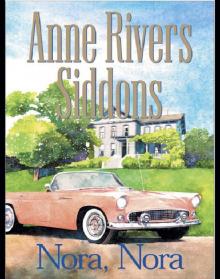 Nora, Nora
Nora, Nora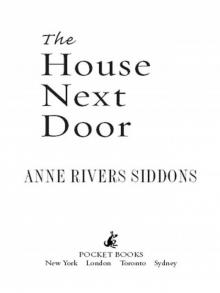 House Next Door
House Next Door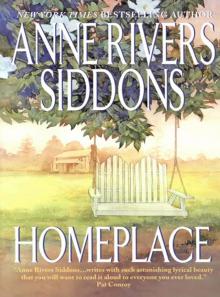 Homeplace
Homeplace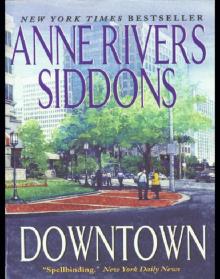 Downtown
Downtown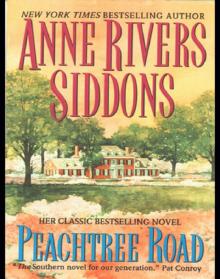 Peachtree Road
Peachtree Road Sweetwater Creek
Sweetwater Creek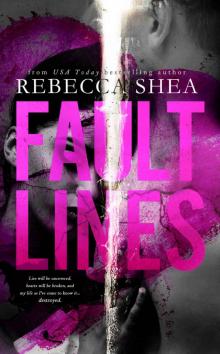 Fault Lines
Fault Lines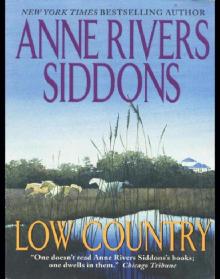 Low Country
Low Country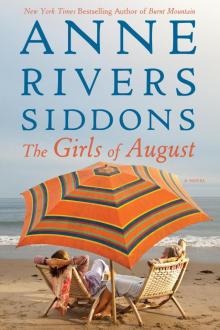 The Girls of August
The Girls of August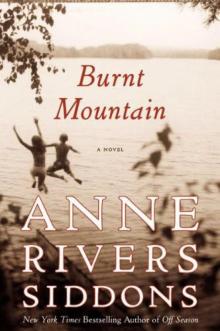 Burnt Mountain
Burnt Mountain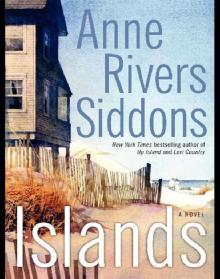 Islands
Islands